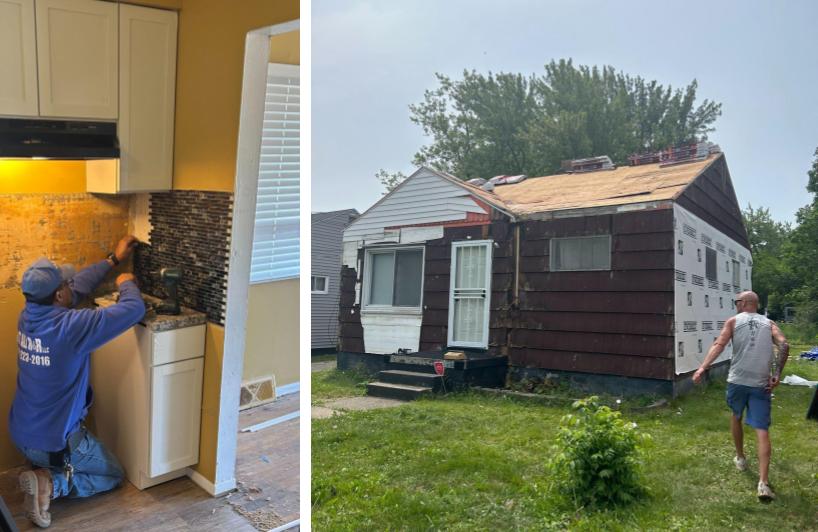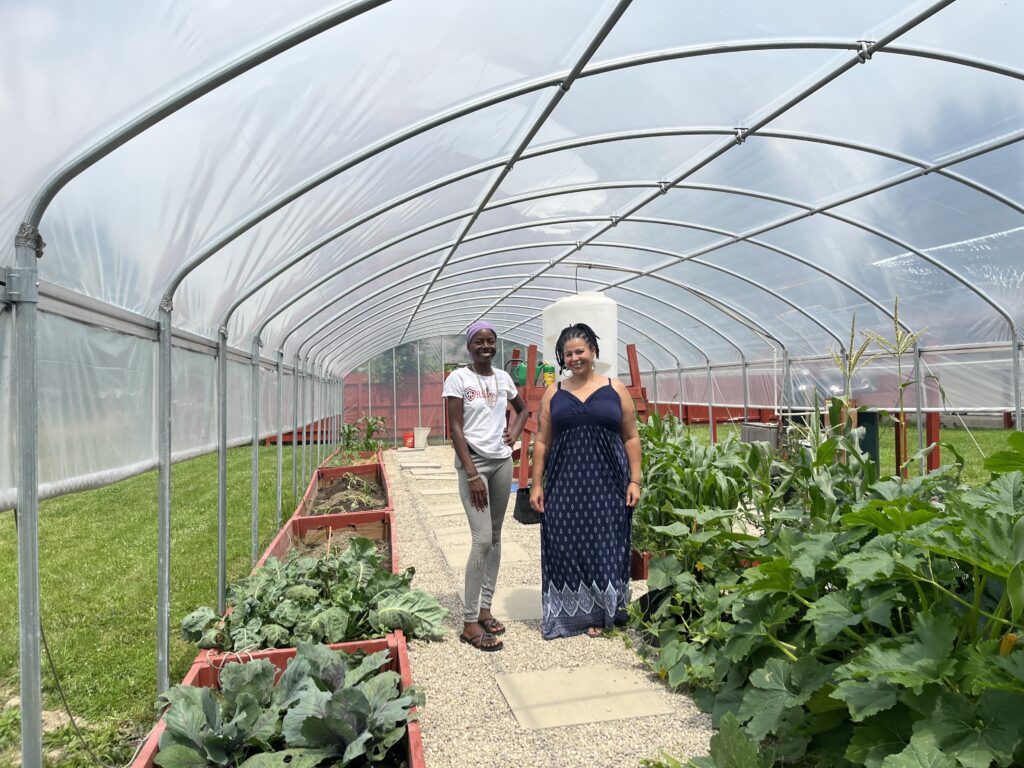Rebuilding Flint One Maroon Porch at a Time

Transitional homes rehabbed by MADE Institute in Flint, all with the porches painted maroon.
Article by Sarah Craft and photos provided by Leon El-Alamin
East Parkway Avenue is a quiet street these days. The homes are modest and well-maintained with tightly mowed lawns, green from the rainy summer. Looking down the street, residents and passersby can’t help but notice the seven homes with porches painted deep a maroon. “We wanted to make sure to leave our mark,” Leon El-Alamin said with pride. “We want you to know this is a MADE house.”
Leon is the founder and CEO of MADE Institute, a nonprofit that provides comprehensive violence prevention, solution-driven research, and workforce development for at-risk youth and returning citizens in Flint. In total, there are 10 maroon-trimmed MADE transitional homes across the community, with five more being rehabbed by the end of the year. Since 2015, these homes have housed several hundred residents transitioning from jail or prison back into society.
Flint is the largest city in Genesee County where more than 16,000 people were sent to jail or prison in 2015 alone. Michigan’s incarceration rate has declined in recent years but more than 50,000 people are currently living behind bars.

Homes being rehabbed to use as transitional housing for formerly incarcerated residents.
MADE’s Mentoring & Services Reduce Recidivism
When someone returns home, there’s a high risk for recidivism unless people have access to basic needs and support services. MADE Institute has helped more than 1,000 returning citizens with transitional housing, access to food, clothes, education, life skills, and a supportive community. Proteges, as returning citizens are called at MADE Institute, are welcomed by a network of mentors who know first-hand what it’s like to return to society.
“There’s no better role model than someone who has been in your shoes,” Leon said. “MADE mentors allow others to see success stories and help them believe that they can be a success story too.”
One mentor, Laurie, spent a decade of her life incarcerated and lived in MADE’s women’s transitional homes for the full two years of her parole. As soon as Laurie got out of prison, MADE helped her access counseling services, enrolled her in life skills programming, connected her to mentors, and helped her get a job at a local restaurant. Today, she’s a manager at her restaurant and regularly mentors other women returning to the community.
One MADE protege, Odell, just got out of prison this summer after serving over 30 years for a crime he committed as a juvenile. Odell is living in a MADE transitional home and got connected to services, obtained his drivers license, and recently secured a job working at LEAR Corporation with a MADE mentor, Tim. Tim was released from Saginaw Correctional Facility in 2010 and started working at LEAR in 2018. Today he’s a supervisor at his workplace and mentors proteges like Odell.
Flint’s Disinvestment and Reinvestment
East Parkway is in Flint’s first ward in the north west corner of the city. It’s a small district of 10,000 people in the two-and-a-half square mile community. It’s also one of the most disadvantaged communities in Flint: The median household income is just $22,000 and more than 40 percent live below the federal poverty line. 92 percent of residents are Black, compared to about 55 percent city-wide.
Flint used to have a thriving middle class but, like so many cities, the population declined dramatically from 1960 – 2010. Today about 82,000 people make up the community as residents and leaders try to reverse the impacts of decades of disinvestment and the long-lingering impacts of the 2014 Flint Water Crisis.

Neighbors Inez and Tiara show off the crops they’re growing in a hoop house built on a formerly vacant property next door to a MADE transitional home.
Approaching 10 Years of Impact
Leon grew up around the corner from the maroon-porch homes on East Parkway. He said it’s almost surreal to look down the block and see so many of them, and to see the street quiet and peaceful. “This is a place I used to help terrorize,” he said.
Leon was a victim of his environment and was deeply impacted by the violence that spread across the North Flint neighborhoods while he was growing up. Leon was incarcerated for crimes he committed in the community and when he returned home in 2010, he saw his city still suffering. Leon launched MADE institute four years later and the organization is planning a 10-year celebration for early 2024.
A large hoop house now sits on a formerly vacant lot next door to one of MADE’s rehabbed transitional homes. Three neighbors grow squash, cucumbers, herbs, tomatoes, and more and the men living in the MADE home helped build the structure, lay pebbles and tiles, and fill the garden beds with dirt. Two of the women growing food in the hoop house, Inez and Tiara, are also taking classes through MADE’s partnership with Google: Taira is learning data analytics and Inez is getting certified in IT support. To them, East Parkway feels like a connected, close-knit community for the first time in a long time.
“Everything we do is about connection,” Leon said. “Elders come out to get food from the garden, young people come out to see the solar panels we installed, we’re getting people certified in tech and skilled trades, formerly incarcerated people are cleaning up and rebuilding the streets they used to terrorize. These porches do more than just house people, they create unity and hope across our neighborhood.”
–
Leon El-Alamin was a 2022 MFF Community Trailblazer Awardee. MADE Institute is currently fundraising for a new commercial building to launch Self-MADE Ventures, which will create social enterprises to provide both vital job training for at-risk-youth and people with criminal histories while also creating a revenue stream to support MADE Institute’s mission. Learn more and donate to this effort here.

